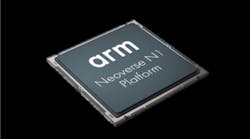Microsoft is getting into the Arm server chip game with a new service from its Azure cloud-computing unit.
On Monday, the company launched a preview of virtual machines (VMs) on its Azure cloud service powered by Arm-based server CPUs from startup Ampere, ratcheting up the pressure on AMD and Intel in the data-center domain.
Microsoft said the service running Ampere's Altra server chips, based on Arm's Neoverse N1 CPU cores, will provide a 50% boost in performance-per-dollar compared with x86 chips for scale-out workloads.
The service is Microsoft’s first to use central processors based on blueprints from Arm, the semiconductor-licensing giant at the heart of most of the world’s smartphones and IoT devices. The new VMs are designed for servers running web, cloud, media, and video game apps, among other uses.
Microsoft’s cloud service is today largely powered by servers running AMD’s EPYC and Intel’s Xeon CPUs.
“Organizations are facing a complex set of challenges as they deploy a broad range of workloads globally, from the edge to the cloud,” Head of Product for Azure Compute Platform Paul Nash said in a blog post on Monday. “There is also a need for a new breed of operationally efficient cloud-native-computing solutions that can meet this demand without a massive growth in infrastructure footprint and energy consumption.”
Last year, Ampere agreed to supply its Altra CPUs for use in Microsoft’s Azure cloud service. The VMs will support Linux, CentOS, and Windows and be deployed on Ampere's Altra CPUs clocked at up to 3 GHz.
According to Microsoft, each virtual machine will support up to 64 virtual CPUs, with up to 8 GB of RAM per processor, up to 40 GB/s of networking capacity, and optional high-performance flash storage.
A new generation of Arm server chips such as Ampere’s Altra CPU is winning slots in the data center, as companies look for chips that offer more performance and burn through less power, thus reducing electricity and other operating costs.
Amazon, the undisputed global leader in the cloud, is on the third generation of its in-house Arm-based CPU, called Graviton. The CPU is powering a growing volume of workloads at its AWS cloud-computing business.
Microsoft's new Arm cloud servers will compete directly with Graviton. AWS has previously said Graviton delivers 40% better performance for cloud apps compared to Intel’s Xeon CPUs, at about a 20% lower cost.
TrendForce, a semiconductor market research firm, estimates that Graviton now accounts for around 15% of cloud instances at AWS, and that AWS will expand the share of its Arm-based offerings to 20% this year.
Ampere, founded by former Intel president Renee James, has also started supplying its Arm-based Altra CPU to Oracle, which rents out its Ampere-based A1 instances as a service to other companies via the cloud.
NVIDIA is leveraging Arm to develop a server processor code-named Grace to take on AMD and Intel in the high-performance computing market. The company plans to roll out the Grace CPU in the first half of 2023.
Marvell canceled plans for a new generation of its Thunder X family of general-purpose Arm-based server processors in 2020. The company said it would instead focus on creating custom Arm chips for major cloud providers.
Power efficiency is a top priority in cloud computing, as it helps keep the sector’s share of global electricity demand in check and increases carbon savings over the vast operations of Amazon, Google, Microsoft, and other cloud players. The sector accounts for 1% of the world’s electricity use today. The power efficiency of Arm’s architecture also allows companies to fit many more single-threaded CPU cores in a single chip.
“The massive scale of a company like Microsoft, which powers 60-plus data-center regions across 140 countries, means it’s critical that the underlying hardware powering this infrastructure is sustainable—not just for the cloud service provider, but the end-users as well,” said Chris Bergey, SVP and GM of the infrastructure chip business at Arm, which is preparing for an IPO after NVIDIA’s takeover unraveled.
While Arm has been able to woo customers with massive cloud data centers, it is a long way from dethroning x86-based chips. The demand for AMD and Intel CPUs that dominate the data center today is not slackening.
Ampere is one of the last merchant semiconductor companies making Arm-based CPUs for servers. The Santa Clara, California-based startup has raised over $425 million from Oracle and other investors, including Arm itself.

